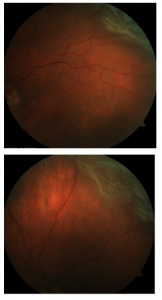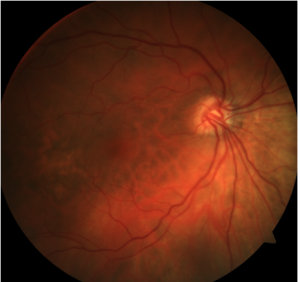Dr. Noskow’s Case Report
Macula-On, Retinal Detachment
A 60-year-old, white female, presents with a chief complaint of a constant “shadow” toward the bottom of her peripheral vision in the left eye, occurring for the past one day. the patient denies any changes to her central (or straight ahead) vision and denies any ocular pain.
This patient has no significant ocular history or family ocular history. her visual acuity on the initial presentation is 20/40- in both her right and left eye. extraocular muscle movement and pupils are within normal limits. confrontation fields (test of peripheral vision) is within normal limits in the right eye, however, are constricted/decreased inferior nasally in the left eye (bottom portion of her vision near her nose)
Intraocular pressure and evaluation of the front surface of both her eyes were all within normal limits.
Upon dilation to view the “back part” of the eyes, otherwise known as the retina & macula, you can see that the tissue called the retina is detached in the superior/temporal location, and was not yet affecting the area of the retina called the “macula”, which is where central vision occurs, making this what we call a macula-on retinal detachment.

Superior temporal, macula-on, retinal
detachment (left eye)

Right eye, normal, no retinal detachment present
Whether the macula is attached (macula-on) vs. the macula being detached (macula-off), defines the urgency in which surgical repair should be taken:
- Macula on detachments are vision threatening and to reduce risk of extension of the detachment to involving the macula (where your central vision occurs) it is a surgical urgency that should be treated within 24 hours
- Macula off detachments are not as urgent and surgery can be delayed up to 1 week
Flashes of light in your vision, loss of vision, the appearance of a curtain or shadow over your vision, and an increase in floaters (black spots/cobweb appearance) are all signs/symptoms of a possible retinal tear or retinal detachment. If you ever experience any of these symptoms, it is important that you have a dilated exam as soon as possible to avoid the risk of permanent vision loss.
